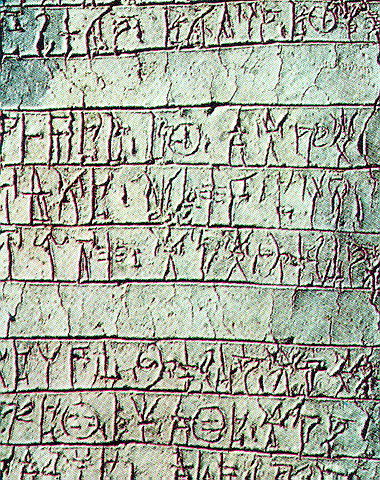Atheists do not lack beliefs about god. They possess a concept of god (this follows simply from the ability to use the word), but they deny that anything which exists is something that the concept applies to.
Infants do not "lack belief in god(s)". It is in fact not true to say that an infant doesn't believe in god. To illustrate:
Imagine someone gave you a list of words that looked something like this:
Chances are you couldn't even pronounce the words on such a list, let alone determine if you possess a concept similar to that the words refer to. Imagine that one of the words was "φαρϝεhα" and another was "ϝρίν". If we say you lack belief in the concept "φαρϝεhα", what about your lack of belief about "φαρϝεhα" is different from your lack of belief about "ϝρίν"? Nothing.
When we refer to lack of belief due to utter ignorance, we refer only to a singular ignorance. An infant cannot lack belief in particular concepts that they do not have, as this would imply that there is something about the lack of the concept "god" that makes it different, for the infant, from the lack of the concept "computer". There is no such distinction and there cannot be.
There is only one thing that anybody can ever not believe in or have beliefs about because they lack any concept of it. Another way to say this is that nobody lacks concept
s, but rather that all concepts one does not possess are for each person a singular thing: ignorance.
Saying infants don't believe in god because they lack beliefs in general isn't just an issue of absurdity and pointlessness. It's illogical and wrong. To say an infant doesn't believe in god isn't just equivalent to saying they don't believe in computers- it is to say that for the infant a "computer" is exactly the same as "god", and thus when we say an infant lacks belief in "god" we are really saying they lack belief in "computers" or in "books" or in "shelves" and so on. These are all a one thing to an infant, but to us they are different concepts. As the concepts are not singular, but the infant's ignorance is, there is no single concept that an infant lacks belief in.
It is thus not true to say that infant's do not believe in god, because that asserts there is a singular concept "god" that the infant differentiates from some other concept. It is only true to say that the concept god doesn't exist for an infant. What they actually don't believe in is a single thing: that which they are ignorant of. This is true for all of us, and to the extent it is possible to not believe something because one lacks any concept of it, it is
it is the only way that anybody can ever not believe in this sense. We are incapable of disbelief in things we have no concept of. Whatever we disbelieve due to utter ignorance is necessarily one thing: what we are ignorant of.

